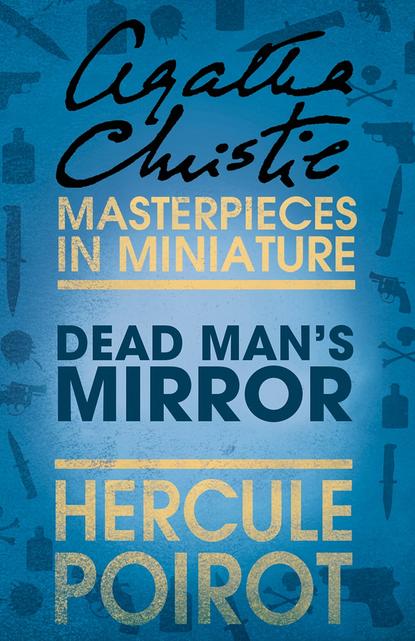По всем вопросам обращайтесь на: info@litportal.ru
(©) 2003-2024.
✖
The Dead Man’s Mirror: A Hercule Poirot Short Story
Автор
Год написания книги
2018
Настройки чтения
Размер шрифта
Высота строк
Поля
The little woman in the pince-nez murmured:
‘Your mother, my dear – don’t you think –?’
In a high, hysterical voice the girl with the red hair cried out:
‘Then it wasn’t a car or a champagne cork! It was a shot we heard …’
Poirot turned and faced them all.
‘Somebody must communicate with the police –’
Ruth Chevenix-Gore cried out violently:
‘No!’
The elderly man with the legal face said:
‘Unavoidable, I am afraid. Will you see to that, Burrows? Hugo –’
Poirot said:
‘You are Mr Hugo Trent?’ to the tall young man with the moustache. ‘It would be well, I think, if everyone except you and I were to leave this room.’
Again his authority was not questioned. The lawyer shepherded the others away. Poirot and Hugo Trent were left alone.
The latter said, staring:
‘Look here – who are you? I mean, I haven’t the foggiest idea. What are you doing here?’
Poirot took a card-case from his pocket and selected a card.
Hugo Trent said, staring at it:
‘Private detective – eh? Of course, I’ve heard of you … But I still don’t see what you are doing here.’
‘You did not know that your uncle – he was your uncle, was he not –?’
Hugo’s eyes dropped for a fleeting moment to the dead man.
‘The Old Man? Yes, he was my uncle all right.’
‘You did not know that he had sent for me?’
Hugo shook his head. He said slowly:
‘I’d no idea of it.’
There was an emotion in his voice that was rather hard to classify. His face looked wooden and stupid – the kind of expression, Poirot thought, that made a useful mask in times of stress.
Poirot said quietly:
‘We are in Westshire, are we not? I know your Chief Constable, Major Riddle, very well.’
Hugo said:
‘Riddle lives about half a mile away. He’ll probably come over himself.’
‘That,’ said Poirot, ‘will be very convenient.’
He began prowling gently round the room. He twitched aside the window curtain and examined the french windows, trying them gently. They were closed.
On the wall behind the desk there hung a round mirror. The mirror was shivered. Poirot bent down and picked up a small object.
‘What’s that?’ asked Hugo Trent.
‘The bullet.’
‘It passed straight through his head and struck the mirror?’
‘It seems so.’
Poirot replaced the bullet meticulously where he had found it. He came up to the desk. Some papers were arranged neatly stacked in heaps. On the blotting-pad itself there was a loose sheet of paper with the word SORRY printed across it in large, shaky handwriting.
Hugo said: ‘He must have written that just before he – did it.’
Poirot nodded thoughtfully.
He looked again at the smashed mirror, then at the dead man. His brow creased itself a little as though in perplexity. He went over to the door, where it hung crookedly with its splintered lock. There was no key in the door, as he knew – otherwise he would not have been able to see through the keyhole. There was no sign of it on the floor. Poirot leaned over the dead man and ran his fingers over him.
‘Yes,’ he said. ‘The key is in his pocket.’
Hugo drew out a cigarette-case and lighted a cigarette. He spoke rather hoarsely.
‘It seems all quite clear,’ he said. ‘My uncle shut himself up in here, scrawled that message on a piece of paper, and then shot himself.’
Poirot nodded meditatively. Hugo went on:
‘But I don’t understand why he sent for you. What was it all about?’
‘That is rather more difficult to explain. While we are waiting, Mr Trent, for the authorities to take charge, perhaps you will tell me exactly who all the people are whom I saw tonight when I arrived?’
‘Who they are?’ Hugo spoke almost absently. ‘Oh, yes, of course. Sorry. Shall we sit down?’ He indicated a settee in the farthest corner of the room from the body. He went on, speaking jerkily: ‘Well, there’s Vanda – my aunt, you know. And Ruth, my cousin. But you know them. Then the other girl is Susan Cardwell. She’s just staying here. And there’s Colonel Bury. He’s an old friend of the family. And Mr Forbes. He’s an old friend, too, besides being the family lawyer and all that. Both the old boys had a passion for Vanda when she was young, and they still hang round in a faithful, devoted sort of way. Ridiculous, but rather touching. Then there’s Godfrey Burrows, the Old Man’s – I mean my uncle’s – secretary, and Miss Lingard, who’s here to help him write a history of the Chevenix-Gores. She mugs up historical stuff for writers. That’s the lot, I think.’
Poirot nodded. Then he said:
‘And I understand you actually heard the shot that killed your uncle?’
‘Yes, we did. Thought it was a champagne cork – at least, I did. Susan and Miss Lingard thought it was a car backfiring outside – the road runs quite near, you know.’

















